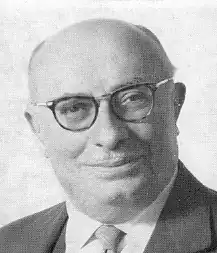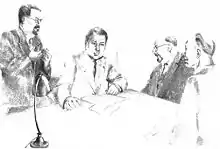

Jacques Duclos (2 October 1896 – 25 April 1975) was a French Communist politician and member of Communist International (Comintern)[1] who played a key role in French politics from 1926, when he entered the French National Assembly after defeating Paul Reynaud, until 1969, when he won a substantial portion of the vote in the presidential elections.
Biography
Duclos was born in Louey, Hautes-Pyrénées in to a strictly religious single parent family.[2] Duclos fought in the Battle of Verdun, where he was wounded. He was captured at Chemin des Dames, and remained a prisoner of war for the remainder of the war. In 1920, he joined the newly formed French Communist Party (PCF). He rose to the Central Committee in 1926, and defeated Léon Blum in the elections for deputy in the 20th arrondissement. He was named head of the propaganda section of the Party in 1936, and was elected to Vice-President of the French National Assembly.
A Stalinist, Duclos was for more than 35 years the brain behind political choices made by Maurice Thorez and Benoît Frachon. He was involved in the International Communist Movement, in the Comintern, and in the Cominform. In the 1930s, he was assigned the task of exerting "discipline" on Communist Movements in Spain (1930, 1935) and Belgium (1934–1935). On Joseph Stalin's orders, he advised the Communist Party of Spain to participate in the Popular Front at the outbreak of the Spanish Civil War.
Upon France's defeat in 1940, Duclos, the most senior PCF official in France, engaged in negotiations with the Nazi authorities with a view to legalising the Communist Party (banned following the signature of the Molotov–Ribbentrop Pact and the declaration of war) as well as requesting permission to restart publication of the PCF daily (L'Humanité) (banned by the French government for the same reasons). The negotiations did not succeed but hurt the PCF's post-war credibility among the populace.
Duclos was the supervisor of the clandestine party throughout the Nazi German Occupation (1940–44), and, with Pierre Villon, took the initiative in creating the Front National resistance movement, which was the political front for the Francs-Tireurs et Partisans (FTP) guerrillas.[3]
After 1950, Thorez's health faltered, but Duclos remained one of the most influential members of the Party. He was acting Secretary General from 1950 to 1953 in Thorez's absence and was instrumental in eliminating his rival André Marty from the Party's leadership. Waldeck Rochet's own failing health prompted Duclos to run as the Party's presidential candidate in the 1969 election, scoring 21.27% of the vote, the highest ever for a communist presidential candidate in France. He died in Montreuil on 25 April 1975 at age 78.
References
- ↑ Drachkovitch, Milorad M. (1973). Biographical Dictionary of the Comintern. Stanford University: Hoover Press. p. 103. ISBN 978-0-8179-8403-8.
- ↑ "Duclos, Jacques". A Dictionary of Political Biography (1st ed.). Oxford: Oxford University Press. 2009. ISBN 9780199569137.
- ↑ Freeman, William M (26 April 1975). "Jacques Duclos of France Dies; Communist Ran for Presidency". New York: The New York Times Company. New York Times. Retrieved 30 October 2023.
External links
- Duclos, Jacques (April 1945). "On the Dissolution of the Communist Party of the United States" (PDF). Cahiers du Communisme. Retrieved 2006-12-23. Reprinted in William Z. Foster et al. Marxism-Leninism vs. Revisionism. New York: New Century Publishers, February 1946, pp. 21–35.